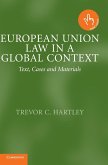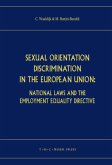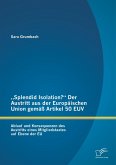European Union Law in a Global Context is a comprehensive introduction to European law in its international context. Trevor Hartley provides an explanation of the basic principles of each topic covered. He examines the institutions of the EU and the law-making process; the European Court and international adjudication; EU law (and international law) in national courts; human rights, especially under EU law and the ECHR; the international relations of the EU; remedies under EU law; and the elements of the free movement of goods, persons and services. The coverage of the practical application of EU law in British courts will meet the requirements of those intending to become practitioners, and the inclusion of extracts from leading cases, as well as from the EC treaties and other instruments, ensures that everything the reader will need is contained in a single volume.
Hinweis: Dieser Artikel kann nur an eine deutsche Lieferadresse ausgeliefert werden.
Hinweis: Dieser Artikel kann nur an eine deutsche Lieferadresse ausgeliefert werden.
'Scholarship on European Union law has proliferated in recent years, but they treat European law as a pure 'local' concept. This book makes a refreshing and unique contribution ... What distinguishes this book from its rivals is the fact that it examines EU law in its international context. In a fascinating way, Hartley convinces his readers to access European law through the prism of globalization ... The entire book is a model for future books on the relations between European law and international law and between European policies and international affairs ... This book can be recommended for two main reasons ... a unique insight into an evolving Union ... Hartley finally convinces us, directly and indirectly, that in order to study the European Union one ought to study it in a global context ... it can be read by European and non-European policy-makers, scholars, practitioners and students and taught in foreign law schools. For Europeans it opens a new window towards understanding the EU in a wider, more pertinent, context, and for non-Europeans it provides a rare source, which, using familiar legal tools, will allow them to acquire fundamental knowledge of European law and policy.' Lior Zemer, University of Leicester








